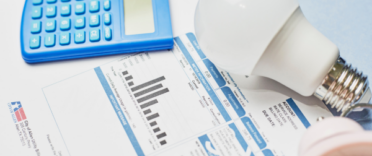
Earlier this month, Ofgem confirmed that the energy price cap will be updated quarterly instead of every 6 months to more accurately reflect the change in energy prices. Today - Friday 26th August 2022 - Ofgem has announced the energy price cap for the period of October - December 2022. The new energy price cap for dual fuel customers from 1st October 2022 will rise 80% meaning the typical annual household energy bill will rise to £3,549 a year from the previous £1,971 in the summer.
In this article, we explain what the energy price cap is and how the rise will affect your energy bill costs.
What is the energy price cap?
The energy price cap is set by the energy regulator Ofgem and sets the maximum amount that energy suppliers can charge per unit of gas and electricity. The price cap is regularly updated to reflect the rising wholesale costs and was recently moved to quarterly updates so that consumers are better protected against high price hikes and can also benefit from price drops sooner.
The following table shows the increase in the energy price cap for October - December 2022 compared to the previous period of April - September 2022.
| Energy price cap period | Gas charges | Electricity charges |
| 1st April 22 - 30th September 22 | £0.26 daily standing charge
£0.07 per kWh |
£0.45 daily standing charge
£0.28 per kWh |
| 1st October 22 - 31st December 22 | £0.28 daily standing charge
£0.15 per kWh |
£0.46 daily standing charge
£0.52 per kWh |
| Increase from previous price cap (£) | £0.02 daily standing charge increase
£0.08 increase per kWh |
£0.01 daily standing charge increase
£0.24 increase per kWh |
How does the energy price cap rise affect your energy bills?
The energy price cap is the maximum amount that suppliers can charge per unit of gas and electricity as well as the standing charge to connect you to the grid. Therefore the increase in the price cap means your energy bills will increase. The energy price cap comes into effect on 1st October 2022 but Ofgem says that it is possible that some suppliers may increase consumers' direct debits before this date in a bid to spread costs.
The energy price cap only sets what each supplier can charge you per unit of energy so the total amount that your energy bill will rise will depend on your energy usage throughout the winter.
How to save money on your energy bills
The government announced its Cost of Living support to help tackle rising living costs. As a result, domestic households across the UK will receive a £400 discount on their energy bills which will be spread across 6 direct debit payments between October and March. If you receive certain benefits you may also be eligible for additional help, we summarise exactly what help is available from the government in our article, 'A complete guide to Cost of Living Payments - are you eligible?'
You can also make minor changes in your home in a bid to reduce your energy usage. We share some energy-saving tips below:
- Use energy-saving light bulbs
- Use the eco setting on the dishwasher
- Only boil the water you need in the kettle
- Switch off appliances on standby
- Wash clothes at 30°C
What to do if you're struggling to pay your energy bills
Contact your supplier
If you're struggling to pay your energy bills you should contact your supplier immediately to discuss an affordable payment plan. Energy suppliers are obligated to help consumers who are struggling to pay their bills and should also direct customers to grants and schemes that are available.
Check if you're eligible for grants or schemes
There are a number of grants and schemes that are available to help with the cost of energy bills throughout the winter. For more information, read our article 'Grants and schemes for help with your energy bills'.
Seek debt advice
If you are struggling to stay on top of your finances it is important that you seek help. There are a number of companies or charities that offer free debt guidance to help you get your finances back on track. Read our article on 'Where to get free debt advice'.




